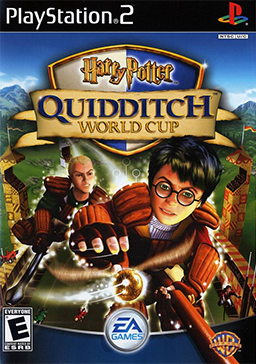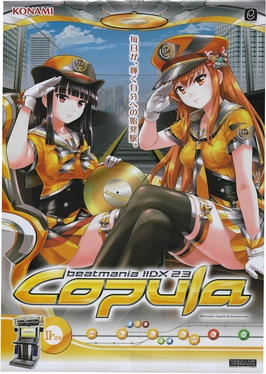A massively multiplayer online role-playing game (MMORPG) is a video game that combines aspects of a role-playing video game and a massively multiplayer online game.
A virtual economy is an emergent economy existing in a virtual world, usually exchanging virtual goods in the context of an online game, particularly in massively multiplayer online games (MMOs). People enter these virtual economies for recreation and entertainment rather than necessity, which means that virtual economies lack the aspects of a real economy that are not considered to be "fun". However, some people do interact with virtual economies for "real" economic benefit.

Harry Potter: Quidditch World Cup is a 2003 sports game that features the fictional sport of Quidditch from the Harry Potter franchise. The game was developed by two teams, EA UK and Magic Pockets, and was published by Electronic Arts. It was released for Game Boy Advance, Microsoft Windows, PlayStation 2, Xbox, and GameCube. The game bears no relation to the abandoned Nintendo 64 project.
Grinding is a term used in video game culture, referring to the act of repeating an action or set of actions, including non-repetitive tasks to achieve a desired result at a level of certain difficulty, typically for an extended period of time, such as earning experience points, in-game loot and currency or to improve a character's stats. Grinding is commonly performed in MMORPGs.
Club Nintendo was a customer loyalty program formerly provided by Nintendo. The loyalty program was free to join and provided rewards in exchange for consumer feedback and loyalty to purchasing official Nintendo products. Members of Club Nintendo earned credits or "coins" by submitting codes found on Nintendo products and systems, which could be traded in for special edition items only available on Club Nintendo. Rewards included objects such as playing cards, tote bags, controllers, downloadable content, and warranty extensions on select Nintendo products.

Shot Online is a massively multiplayer online golf video game which also features character development and MMORPG elements. It is developed by the Seoul-based game developer WebzenOnNet Co. Ltd., and published by Webzen under their game portal website, GamesCampus. Although there is no subscription fee or cost to download and play the game, the game offers upgraded "Gold" membership plans for a monthly fee, and additional items may be purchased using real currency through the game's website.
Himbo, a portmanteau of the English masculine pronoun him and bimbo, is a slang term for a sexually attractive, sexualized, naïve and unintelligent man. The first known use dates back to 1988; the word gained renewed popularity and attention in the 2010s and 2020s. Since its inception, the term and the stereotype it describes have generated a range of commentary and reactions from writers, entertainers, linguists, and cultural analysts.

Metin2 is a massively multiplayer online role-playing game (MMORPG) originally developed by Ymir Entertainment and originally released in Korea in 2004. It has since been published in many European countries and in the United States by Gameforge 4D GmbH. Other versions exist in Asian languages.
Twilight Heroes is a browser-based, multiplayer role playing game designed and operated and released by American studio Quirkz Media in October 2007. In 2011, operation were subsequently taken over by Metroplexity Games.
World of Warcraft, or WoW, is set in a fictional universe, its primary setting being the planet of Azeroth. The first expansion, The Burning Crusade, introduced a second planet, Outland. Wrath of the Lich King and Cataclysm expanded upon Azeroth and respectively added Northrend, the frigid northern continent of Azeroth, and drastically changed various other continents by destroying some and unveiling new ones. The next expansion, Mists of Pandaria, added Pandaria, the southern continent previously hidden behind a perennial mist cover. Warlords of Draenor introduced the planet of Draenor, a version of Outland in a different timeline before its partial destruction. The Legion expansion took adventurers to the Broken Isles, an island chain near the Maelstrom in the middle of the Great Sea, and the damaged planet Argus, the headquarters of the Burning Legion. The seventh expansion, Battle for Azeroth, added two new island continents to the center of Azeroth: Kul Tiras and Zandalar. The latest expansion, Shadowlands, introduced the eponymous Shadowlands, a realm composed of five major zones: Bastion, Maldraxxus, Ardenweald, Revendreth, and the Maw.

Stardoll is a browser-based game from Glorious Games. One of the world's largest online fashion communities, Stardoll has reached over 400 million users as of January 2016.
Dragon kill points or DKP are a semi-formal score-keeping system used by guilds in massively multiplayer online games. Players in these games are faced with large scale challenges, or raids, which may only be surmounted through the concerted effort of dozens of players at a time. While many players may be involved in defeating a boss, the boss will reward the group with only a small number of items desired by the players. Faced with this scarcity, some system of fairly distributing the items must be established. Used originally in the massively multiplayer online role-playing game EverQuest, dragon kill points are points that are awarded to players for defeating bosses and redeemed for items that those bosses would "drop". At the time, most of the bosses faced by the players were dragons, hence the name.
Tanki Online (TO) is a browser-based multiplayer free-to-play video game created and published by AlternativaPlatform. It was released on June 4, 2009.
Forumwarz is a multiplayer browser-based role-playing game that is a parody of Internet culture designed by Crotch Zombie Productions, a Toronto-based company run by Robin Ward, Mike Drach, and Jason Kogan. Written in the Ruby on Rails web application framework using the Haml markup language, the game launched on February 7, 2008. In the first month since the game launched, around 30,000 users signed up.

Tetris Friends was an online Tetris game developed by Tetris Online, Inc. Registered users were able to compare their scores with their friends and with the entire community. It was the only official Flash implementation of Tetris made by the Tetris company itself. At the time, it was also the only official Tetris platform that had advertisements play before a match. Tetris Friends had over a million registered users.

World of Warplanes (WoWp) is a free-to-play aerial combat massively multiplayer online (MMO) game developed by Persha Studia and published by Wargaming.net. The game was originally released in November 2013 in CIS countries, North America and Europe. It was relaunched as World of Warplanes 2.0 in October 2017 in the same countries, achieving significantly better reception.

My Little Pony: Friendship Is Magic is a video game based on the animated television series My Little Pony: Friendship Is Magic. It was developed by Gameloft for iOS and Android devices and is recommended at children aged 5 to 12. The game was released on November 8, 2012.

GolfStar is a massively multiplayer online golf video game which features character development and MMORPG elements. It is developed by the South Korean game developer Com2Us. The English-language Microsoft Windows version is published by German game publisher gamigo AG. An alternate version for iOS and Android also exists, self-published by Com2Us. Although there is no subscription fee or cost to download and play the game, the game offers "Star" and "Star Premium" membership plans for a monthly fee. Additional in-game items may also be purchased with real currency.

Dragon Mania Legends is a 2015 casual mobile game developed and published by Gameloft. It is a sequel to the game, Dragon Mania. It was released on January 8, 2015 for iOS and Android. It was later released for Windows Phone and Microsoft Windows.

Beatmania IIDX 23: Copula is the 23rd installment of the Beatmania IIDX series. The first location test was held at the Tokyo Lesiure Land #2 location in Akihabara, Japan from July 10 through July 12, 2015. It was released on November 11, 2015. It was the last entry in the Beatmania series made by Konami Digital Entertainment before the division was renamed Konami Amusement.










